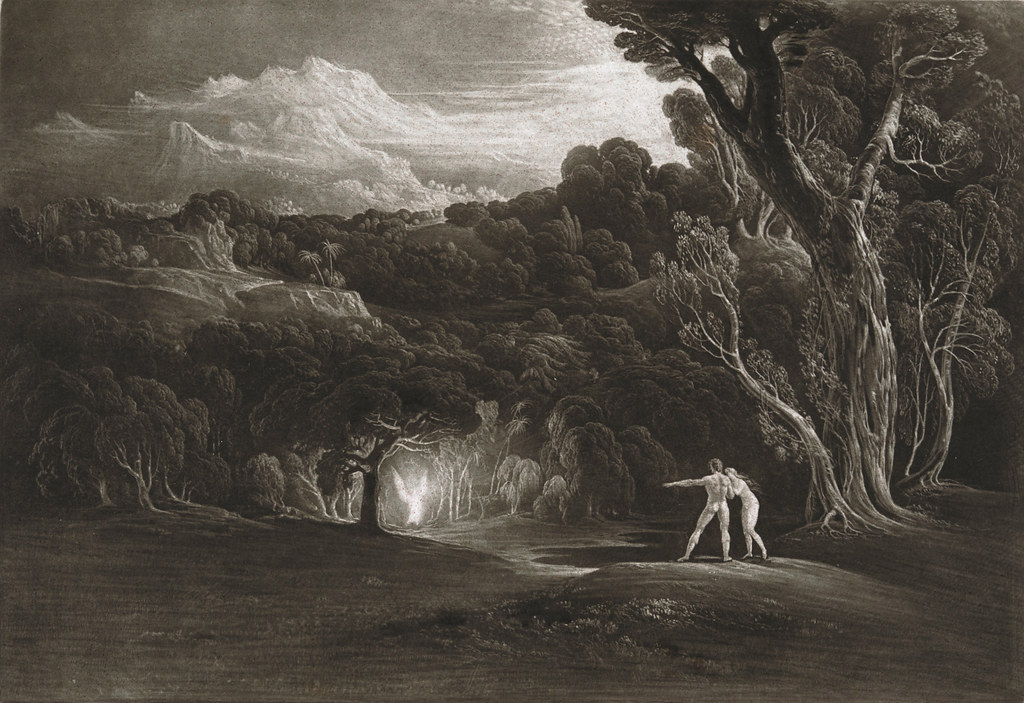Misogyny lost, and regained

Accusations of misogyny, the very same which plague the Biblical stories upon which his epic is based, have long followed John Milton’s highly influential Paradise Lost. The story at its core tells of a fallen woman tempting her companion, bringing in one fell swoop the whole of misery and suffering upon humankind for all generations to come. While this level of blame-placing is inherent in the Bible and therefore inescapable to Milton, he did put forth a fair number of rather progressive elements to suggest that there was more to Eve than her sinfulness, and more between the male and female sexes than a relationship of dominance and submission, respectively. At different points in Paradise Lost, it appears as though Milton attempts to shed some of the misogynistic notions in his contemporary culture, but he ultimately succumbs to these same phallocentric machinations and—despite his controversial sympathizing at certain points in his narrative with the character of Lucifer himself—casts Eve once again as the villain of his tale.
Immediately after learning of Eve’s failure in the face of temptation in Book IX, Adam bemoans the colossal loss by calling her, and by extension, women, “fairest of creation, last and best / Of all God’s works.”1 Of course, praise like this was likely attributable to her more fleshy qualities, rendering Eve and all womankind a sex object, the best among creation in the eyes of man. However, Adam does shed some light on the actual depth of their relationship further down the page when he says,
Should God create another Eve, and I
Another rib afford, yet loss of thee
Would never from my heart.1
Milton shifts between these two perspectives in similar ways at other points throughout the epic, alternatively casting his Eve as heroine or plaything. Regardless, there is indeed something to be said for the implied relationship between the couple as Milton portrays them, a pseudoromance not present in the Book of Genesis from whence the tale originates. The two are shown to be something of copartners, which could be read as a modernization of the Biblical text in light of the more romantic sensibilities of many of Milton’s literary contemporaries.
In any event, the fundamental element of the story of the fall of man is inescapable, as Milton’s Paradise Lost is no different in blaming the woman as the Abrahamic desert dwellers who originally invented the stories did. Eve, fully knowledgable of what the ramifications of her actions will be as she tells the serpent, “God hath said, ‘Ye shall not eat / Thereof, nor shall ye touch it, lest ye die,”1 decides regardless that she ought consume the forbidden fruit and gain whichever false benefits the tempter had promised her. It is even mentioned how “[i]nto her heart too easy [was] entrance won” by the serpent,1 suggesting that convincing her to rebuke God’s commandments should have been much more difficult than it eventually was. All these are ways to pin culpability for the fall of mankind onto the woman’s shoulders, and, in all fairness to Milton, these were all elements intrinsically present in the original source Bible narrative.
Outside her culpability, however, is the issue of Milton’s own misogynistic contributions to the narrative as he attempts to color characters’ dialogue with their opinions and “common sense” stances. For example, when discussing whether or not they should separate to perform different labors more effectively, Adam tells Eve that “nothing lovelier can be found / In woman, than to study household good,”1 lending a prototype version of the cult of domesticity a fair bit of credence by imbuing it with Biblical statute. When considering his eventual temptation of humankind and watching Eve alone in the Garden, Satan reflects on how “[t]he woman, opportune to all attempts” to tempt her, is more likely game than “[h]er husband . . . [w]hose higher intellectual . . . I shun.”1 Essentially, the serpent chooses—and rightly, as it happens within the narrative—to tempt the weaker of the sexes when she is alone and away from her man’s influence. Furthermore, the inborn disadvantages of woman relative to men are most visibly displayed in the passage where Eve considers whether she should “give [Adam] to partake / Full happiness with [her]” in sharing the fruit of knowledge with him.1 Therein, she says,
. . . So to add what wants
In female sex, the more to draw his love,
And render me more equal, and perhaps,
A thing not undesirable, sometime
Superior; for inferior who is free?1
Here, she admits openly that there are things “wanting” in the female sex that, with the assistance of the tree of knowledge, might be added and “render [her] more equal” with Adam. She even, conspiratorially, ponders the idea that her added powers might one day make her not only on par with Adam and men, but even superior to them. For who, when inferior, she wonders, is truly free?
Despite his best efforts to infuse a primitive understanding of feminism into the classically-misogynistic narrative, Milton falls hopelessly short in his depiction of Eve even separate from inescapable Biblical biases. In their musings on their own natures, Milton’s characters of Adam and Eve reveal the author’s own deep-rooted prejudices and misogynistic beliefs—perhaps byproducts of his phallocentric society. Symptomatic of the rampant misogyny of primitive cultures, the original Book of Genesis version of the fall of man cannot be divorced from its overarching resentment towards Eve, and towards female temptresses in the abstract. So far as “failing, hapless Eve”1 is concerned, it would appear that, despite their perhaps well-intentioned efforts, neither any writer nor audience of any millennium will be able to fully strip this Biblical myth of its intrinsic misogyny.